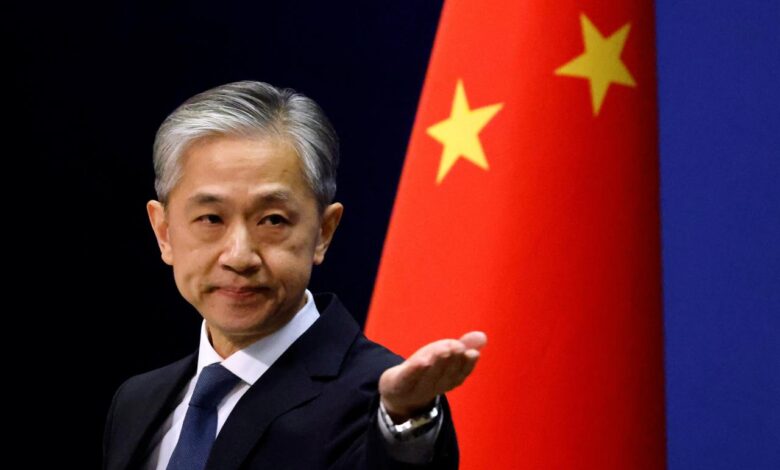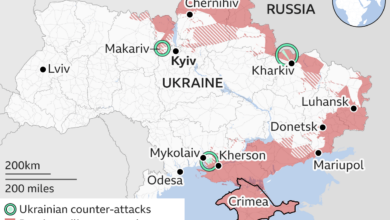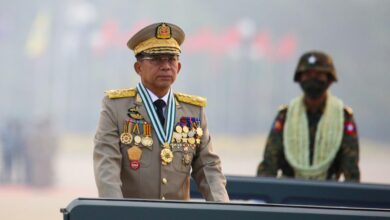
China unites America and Europe in alarm
China unites America and Europe in alarm – that’s the chilling reality unfolding before our eyes. From aggressive trade practices to advancements in technology that raise serious security concerns, China’s actions are forcing a reluctant alliance between its two biggest geopolitical rivals. This isn’t just about economics; it’s about a fundamental challenge to the global order, a clash of ideologies, and a race for technological dominance.
This post dives deep into the specifics, exploring the concerns, the responses, and the potential consequences of this rapidly evolving situation.
We’ll examine the specific actions fueling this unease, from alleged intellectual property theft and unfair trade practices to China’s assertive military posturing in the South China Sea. We’ll analyze the economic interdependence between these three power blocs, looking at areas of vulnerability and potential for economic decoupling. Furthermore, we’ll explore the technological arms race, the human rights implications, and the role of international organizations in navigating this complex landscape.
Get ready for a fascinating, and frankly, slightly unnerving, journey into the heart of a new geopolitical reality.
Geopolitical Implications of China’s Actions
China’s increasingly assertive foreign policy is raising significant concerns in the US and Europe, fundamentally altering the geopolitical landscape and challenging the existing global order. This shift is driven by a combination of economic ambitions, military modernization, and a more nationalistic approach to international relations. The resulting tensions are reshaping alliances and prompting significant shifts in global power dynamics.
Specific Actions Causing Alarm
China’s actions in the South China Sea, including its construction of artificial islands and assertive claims to disputed territories, are a major source of concern. These actions disregard international law, specifically the United Nations Convention on the Law of the Sea (UNCLOS), and threaten freedom of navigation in a crucial waterway for global trade. Simultaneously, China’s growing military power, including its development of advanced weaponry and its expanding naval presence, is perceived as a direct challenge to US and European influence in the Indo-Pacific region.
Furthermore, China’s increasingly aggressive stance towards Taiwan, including military drills and heightened rhetoric, fuels fears of potential conflict and instability in the region. Finally, China’s influence operations, including economic coercion and the use of propaganda, are perceived as attempts to undermine democratic values and institutions globally.
Challenge to the Existing Global Order
China’s actions directly challenge the existing liberal international order, characterized by rules-based international institutions and a commitment to multilateralism. China’s pursuit of its own vision of a multipolar world, often prioritizing national interests over international norms, is leading to a more fragmented and less predictable global system. The emphasis on state sovereignty and non-interference in internal affairs, often used to justify China’s actions in Xinjiang and Hong Kong, directly clashes with Western values and norms concerning human rights and democratic governance.
This challenge extends to economic spheres, with China’s growing economic influence leading to concerns about unfair trade practices and intellectual property theft.
US and EU Responses
The US and EU, while sharing concerns about China’s actions, have adopted somewhat different approaches. The US has adopted a more confrontational strategy, focusing on building alliances, imposing sanctions, and engaging in military deterrence. This approach emphasizes competition and the need to counter China’s growing power. The EU, while increasingly critical of China’s human rights record and economic practices, has generally favored a more nuanced approach, seeking to engage with China through dialogue and cooperation while also protecting its interests.
China’s actions are causing serious concern, uniting unlikely allies across the Atlantic. It’s a situation that feels almost fictional, reminding me of the heightened stakes portrayed in some of the best fictional election stories; check out this awesome list of films and TV shows focusing on just that, the best film and tv featuring fictional american elections , for a fascinating look at how such narratives play out.
The parallels to our current geopolitical reality with China are, frankly, a little unsettling.
This difference reflects differing strategic priorities and historical relationships with China.
Potential for Increased Military Spending
The rising tensions with China are likely to lead to increased military spending in both the US and Europe. The US is already investing heavily in military modernization and expanding its presence in the Indo-Pacific. European countries are also reassessing their defense budgets and strengthening their military capabilities, particularly in areas such as naval power and cyber warfare.
This increased military spending reflects a growing recognition of the need to deter potential aggression and protect national interests in the face of China’s growing military power. The arms race, however, also carries significant economic and geopolitical risks.
Economic Interdependence and Vulnerabilities
| Country | Trade with China (USD Trillion) | Investment in China (USD Billion) | Key Vulnerabilities |
|---|---|---|---|
| US | ~0.7 (2022 est.) | ~200 (2022 est.) | Supply chain dependence on Chinese manufacturing, intellectual property theft, market access restrictions |
| EU | ~1.0 (2022 est.) | ~300 (2022 est.) | Dependence on Chinese rare earth minerals, market access for European businesses, human rights concerns impacting consumer sentiment |
| China | ~1.7 (2022 est.) Total Trade | N/A | Dependence on export markets (US and EU), vulnerability to trade restrictions, potential for economic decoupling |
(Note
These figures are estimates and vary depending on the source and year. The table aims to illustrate the relative levels of interdependence.)*
Economic Concerns and Trade Relations: China Unites America And Europe In Alarm

China’s increasingly assertive economic policies are causing significant unease among its trading partners, particularly in the US and EU. The sheer scale of China’s economy and its interconnectedness with global supply chains mean that its actions have far-reaching consequences, impacting various sectors and potentially destabilizing the existing international economic order. This section will delve into the key economic concerns stemming from China’s actions and explore potential responses from the West.
Key Sectors Affected by China’s Economic Actions
China’s influence is felt across numerous sectors. Technology, manufacturing, and agriculture are particularly vulnerable. The technology sector faces challenges from China’s aggressive pursuit of technological self-reliance, including intellectual property theft and unfair competition. Manufacturing is impacted by China’s dominance in global supply chains, leading to concerns about dependence and potential disruptions. Agriculture is affected by China’s trade practices, including subsidies and market access restrictions.
These sectors are not isolated; disruption in one area quickly ripples through others, creating a complex web of economic interdependence and vulnerability.
China’s aggressive actions are uniting unlikely allies; the US and Europe find themselves on the same page regarding growing concerns. This shared anxiety is further fueled by revelations, like those detailed in this shocking report: over 50 Biden administration employees from 12 US agencies involved in social media censorship push documents , which highlights a domestic issue potentially distracting from the larger, international threat.
The convergence of these two alarming trends only underscores the need for strong, coordinated responses.
Examples of Concerning Trade Practices
Several of China’s trade practices raise significant concerns. These include the forced technology transfer demanded from foreign companies operating in China, the subsidization of state-owned enterprises creating an uneven playing field for international competitors, and the use of non-tariff barriers such as overly complex regulations and bureaucratic hurdles to restrict imports. The lack of transparency in China’s regulatory processes also contributes to uncertainty and risk for foreign investors.
For example, the sudden imposition of sanctions or changes in regulations can severely impact businesses operating within China, demonstrating the precarious nature of relying on the Chinese market.
China’s increasingly aggressive actions are uniting unlikely allies; the US and Europe find themselves on the same page regarding the threat. Meanwhile, domestically, the focus remains intensely on the legal battles surrounding Trump, as evidenced by this recent development: trump files motion seeking to prevent doj access to mar a lago records until special master appointed.
However, the looming shadow of China’s actions continues to overshadow even this significant legal drama, forging an unusual sense of unity amongst global powers.
Potential for Economic Decoupling
The growing tensions between China and the West are raising the specter of economic decoupling – a partial or complete separation of the economies. While a complete decoupling is unlikely in the short term due to the deeply intertwined nature of global supply chains, a partial decoupling, focusing on critical technologies and sensitive sectors, is increasingly probable. This could involve diversification of supply chains, the relocation of manufacturing facilities, and the implementation of stricter trade controls.
Strategies for Mitigating Economic Risks
The US and EU are exploring various strategies to mitigate economic risks associated with China. These include strengthening domestic industries, diversifying supply chains away from over-reliance on China, investing in research and development to reduce technological dependence, and working collaboratively to establish fairer trade practices through international agreements and negotiations. The emphasis is on building resilience and reducing vulnerability to potential economic shocks emanating from China.
Hypothetical Scenario: Complete Economic Decoupling
A complete economic decoupling would have profound global consequences. Imagine a scenario where the US and EU completely sever economic ties with China. Global supply chains would be severely disrupted, leading to shortages of goods and increased prices. International trade would plummet, triggering a global recession. Investment flows would be drastically reduced, impacting economic growth worldwide.
Furthermore, the absence of significant trade between the world’s largest economies would likely lead to geopolitical instability and increased international tensions. While this is a hypothetical extreme, it highlights the significant risks associated with escalating economic tensions between China and the West.
The Role of International Organizations
International organizations like the United Nations (UN) and the World Trade Organization (WTO) play a crucial role in shaping the global response to China’s rising influence. Their effectiveness, however, is significantly challenged by the complexities of China’s economic and political strategies, and the inherent limitations of these organizations themselves. Understanding their role, limitations, and potential reforms is critical for navigating the evolving geopolitical landscape.The UN, with its broad mandate encompassing peace and security, human rights, and development, attempts to address concerns about China through various mechanisms, including resolutions in the General Assembly and reports from human rights bodies.
The WTO, focused on regulating international trade, provides a framework for addressing trade disputes involving China. However, both organizations face significant challenges in effectively managing China’s actions.
Challenges Faced by International Organizations in Dealing with China
China’s increasing economic and political power significantly impacts the effectiveness of international organizations. Its use of veto power in the UN Security Council can obstruct actions against its perceived interests. Furthermore, China’s growing influence within these organizations allows it to shape agendas and influence decision-making processes. The WTO’s dispute settlement system, while designed to resolve trade conflicts, has faced difficulties in enforcing rulings against China, especially in areas concerning intellectual property rights and state-owned enterprises.
The sheer scale of China’s economy and its intricate web of bilateral agreements also complicate the application of multilateral rules and norms. For example, the WTO’s dispute settlement mechanism, while designed to be impartial, has been criticized for its slow pace and limited enforcement power, particularly when dealing with a major economic power like China. This has led to instances where China’s non-compliance with rulings remains unaddressed.
Effectiveness of Different Approaches Taken by International Organizations
Different approaches by international organizations have yielded varying degrees of success. The UN’s human rights mechanisms, for example, have documented numerous human rights concerns in Xinjiang, but their impact on China’s policies has been limited due to China’s resistance and the lack of effective enforcement mechanisms. Conversely, the WTO’s dispute settlement system, despite its limitations, has achieved some success in addressing specific trade disputes with China, though enforcement remains a persistent challenge.
A comparative analysis reveals that approaches that leverage collective action, such as coordinated sanctions or joint diplomatic initiatives, tend to be more effective than unilateral actions by individual states or organizations. However, achieving such collective action requires overcoming significant political hurdles, particularly given the diverse interests and priorities of member states.
Potential Reforms to Strengthen International Organizations’ Response to China, China unites america and europe in alarm
Strengthening the ability of international organizations to respond to China’s actions requires a multifaceted approach. Reforms to the UN Security Council, including expanding its permanent membership to better reflect the global power balance, could enhance its legitimacy and effectiveness. Strengthening the WTO’s dispute settlement system, perhaps through improved enforcement mechanisms and a more streamlined process, is crucial. Greater transparency and accountability in the decision-making processes of these organizations are also essential.
Furthermore, fostering stronger collaboration between international organizations and regional organizations could enhance the overall effectiveness of the global governance system. For instance, the G7 and the EU could work more closely with the UN and WTO to coordinate their responses to China’s actions, increasing pressure and promoting a more unified front.
A Scenario Illustrating Improved International Cooperation
Imagine a scenario where a coordinated response from the UN, WTO, and major economic powers leads to a significant shift in China’s behavior. A series of well-documented human rights violations in Xinjiang, supported by strong evidence gathered by UN human rights bodies, prompts a joint statement from the UN Human Rights Council, the G7, and the EU, condemning these actions.
This is followed by coordinated sanctions targeting specific Chinese officials and entities implicated in the violations. Simultaneously, the WTO successfully enforces a ruling against China for unfair trade practices, leading to increased pressure on China to reform its economic policies. This coordinated pressure, based on a strong evidence base and unified international action, could compel China to reconsider its approach, leading to improved human rights practices and fairer trade practices.
This scenario highlights how improved international cooperation, backed by credible evidence and a commitment to collective action, can significantly influence China’s behavior and promote a more just and equitable global order. While such a scenario is not guaranteed, it illustrates the potential benefits of strengthened international cooperation.
Public Opinion and Domestic Politics

The rising global influence of China has significantly impacted public opinion and domestic politics in both the US and Europe, shaping the responses of these regions to China’s actions on a multitude of fronts. Understanding these dynamics is crucial to comprehending the complex geopolitical landscape.Public perception of China is far from uniform, varying considerably across different demographics and countries.
While some view China as an economic partner offering opportunities for growth and trade, others perceive it as a geopolitical rival with expansionist ambitions and a poor human rights record. These differing perspectives heavily influence domestic political debates and foreign policy decisions.
Public Perception of China in the US and Europe
In the United States, public opinion towards China has become increasingly negative in recent years, fueled by concerns over trade imbalances, intellectual property theft, human rights abuses in Xinjiang and Hong Kong, and China’s growing military power. This negative sentiment is reflected in both Republican and Democratic circles, although the specific policy prescriptions differ. In Europe, the perception is more nuanced.
While concerns exist regarding human rights and economic competition, many European nations also maintain significant trade ties with China and seek to engage in diplomatic dialogue. This leads to a more diverse range of opinions and approaches within the EU compared to the more unified negative sentiment in the US.
Domestic Political Considerations Influencing Responses
Domestic political considerations significantly shape the responses of the US and the EU to China. In the US, the China issue has become deeply intertwined with partisan politics. Republicans tend to adopt a more hawkish stance, emphasizing containment and competition, while Democrats, while also expressing concerns, may advocate for a more nuanced approach balancing competition with cooperation. In Europe, the situation is more complex due to the diversity of national interests and political systems within the EU.
Countries with stronger economic ties to China, such as Germany, may be more hesitant to adopt aggressive policies, while others may prioritize human rights and security concerns.
Comparison of Political Discourse Surrounding China
The political discourse surrounding China differs markedly between the US and various European nations. The US often frames China as a strategic competitor or even adversary, emphasizing the need for a strong defense and assertive diplomacy. This is reflected in the rhetoric of government officials and the media. In Europe, the discourse is more varied. While concerns about China’s actions exist, the emphasis on multilateralism and diplomacy is often stronger.
Some European countries prioritize economic engagement, while others focus more on human rights issues. This leads to a less unified and more fragmented approach within the EU compared to the relatively more consolidated US strategy.
Impact of Public Opinion on Foreign Policy Decisions
Public opinion exerts a significant influence on foreign policy decisions related to China. In both the US and Europe, strong public disapproval of China’s actions can pressure governments to adopt more assertive policies. This pressure can manifest through public protests, media coverage, and electoral politics. Conversely, if public opinion is more ambivalent or supportive of engagement with China, governments may be more inclined to pursue diplomatic solutions and economic cooperation.
The strength of this influence varies depending on the specific issue and the political context.
Hypothetical News Article: Public Reaction to a Chinese Cyberattack
Headline: Massive Cyberattack on US Infrastructure Blamed on China; Public Outrage Erupts Article Excerpt: A devastating cyberattack targeting critical US infrastructure, including power grids and financial institutions, has been attributed to Chinese state-sponsored hackers. The attack, which caused widespread disruptions and significant economic damage, has ignited a firestorm of public outrage. Polls show a dramatic surge in negative sentiment towards China, with many calling for immediate and decisive action from the government.
While the White House has yet to officially confirm Chinese involvement, the public pressure is mounting for a strong response, ranging from economic sanctions to military countermeasures. Experts warn that the incident could significantly escalate tensions between the US and China, further complicating already strained relations. The incident has sparked heated debates on Capitol Hill, with bipartisan calls for enhanced cybersecurity measures and a reassessment of US-China relations.
The alarm bells are ringing loud and clear. China’s actions are forcing the US and Europe into an uneasy but necessary partnership, a response driven by concerns about economic security, technological dominance, and human rights. The future remains uncertain, but one thing is clear: the world is witnessing a profound shift in the global balance of power, with potentially far-reaching consequences for everyone.
The question now is not
-if* the West will respond, but
-how* effectively they will coordinate their efforts to navigate this complex and challenging new world order. The stakes are incredibly high.




